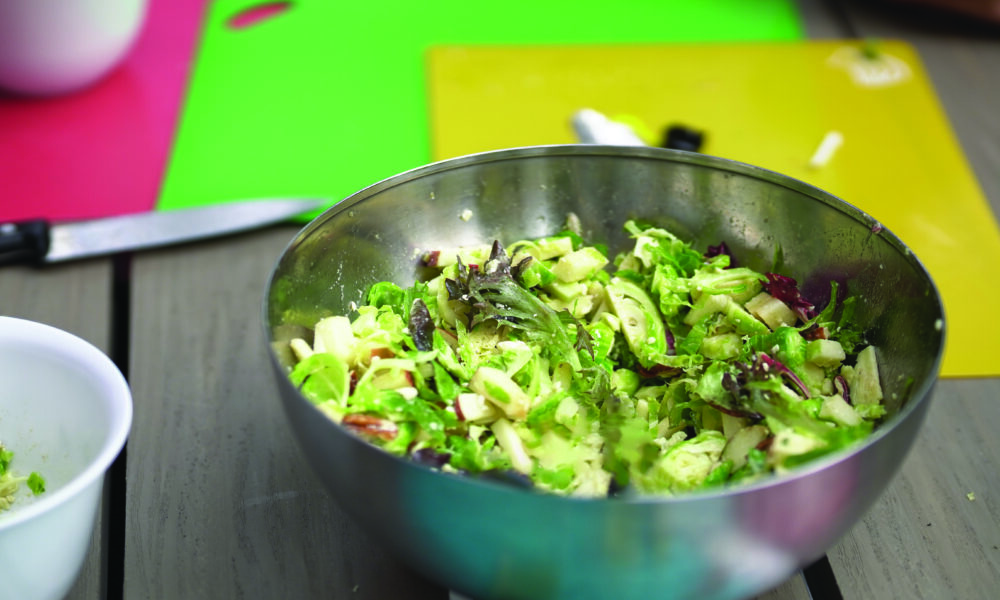On Sept. 28, the Student Nutrition Accessibility Club (SNAC) held a workshop in the Education Garden—a community garden on McGill’s campus. The garden, now tucked away on Peel Street near the Faculty of Education, was created in 2015, closed down during the COVID-19 pandemic, and subsequently re-opened at its current location in October 2022. The workshop demonstrated how to make appealing and healthy food from simple, fresh ingredients.
SNAC is a sustainability-focused group committed to reducing food waste and spreading awareness about nutrition and food sustainability. Since its establishment in 2011, SNAC’s main projects have been nutrition workshops and the ‘Good Food Box.’ As of 2023, SNAC is also a Students’ Society of McGill University (SSMU) service.
The “Evening in the Garden” was SNAC’s first workshop since the COVID-19 pandemic, hosted by SNAC’s vice president (VP) Workshops Sophie Cooke, U3 Arts, and the garden’s coordinator Eva Colleoni, U4 Education.
After a brief introduction and tour of the garden by Colleoni and Emily Sprowls, Education Faculty Lecturer and Ph.D. student, Cooke led attendees in preparing a simple salad of Brussels sprouts, apples, and pecans—all seasonal vegetables provided by SNAC. The McGill Plate Club offered the chopping boards, knives, bowls, and other tableware used during the event.
According to Cooke, who has been working with SNAC since 2021, workshops such as this intend to demonstrate how to prepare a nutritious meal with raw fruits and vegetables. In an interview with The Tribune, Cooke said she feels that cooking is an oft-neglected skill among our student body.
“People don’t have time, they don’t have the budget, or they never learned how to cook,” Cooke said.
Workshops such as this, she hopes, can empower students to take initiative and foster healthier cooking and eating habits at home.
SNAC also intends to improve the diet of McGill students, especially those facing food insecurity, through their ‘Good Food Box’ project. According to its executives, the club distributes fruits and vegetables to around 70 people every week, cost-free. The initiative has been operational for 12 years with the help of the Sustainability Projects Fund.
In an email to The Tribune, Alexa Infelise, SNAC’s Co-President, said that the group has recently partnered with family-owned grocery distributor TerraBella. TerraBella provides affordable food from certified organic wholesale companies, seasonally and locally sourced. The produce is then purchased by SNAC through their funds and distributed.
“Through funding from the Sustainability Projects Fund […] at McGill, we are now able to offer fresh fruits and vegetables for free each week,” Infelise said.
When speaking to The Tribune, Colleoni explained that the Education Garden does not have hopes about feeding the entire student body, indicating the size of the recent blueberry harvest with a single cupped hand. The garden stands as a demonstration plot to help Colleoni and others understand urban agriculture, and show the potential that urban farming holds.
“There is more of an educational focus and this was thought to be an outdoor classroom, […] a place to teach about things like urban agriculture and horticulture, doing things outside, and outdoor education.”.
Liam Gaither, VP External Affairs, spoke to The Tribune and said that even though SSMU has multiple ongoing projects to combat food insecurity such as SNAC and the Grocery Program, the McGill administration is responsible for addressing this issue amongst the university population.
“Food insecurity should not have to be [SSMU’s] responsibility,” Gaither said. “It should be the responsibility of the university […] The things that we can do are limited by time, space, [and] money.”







